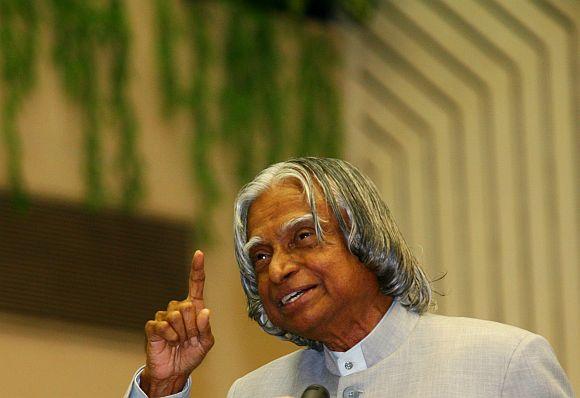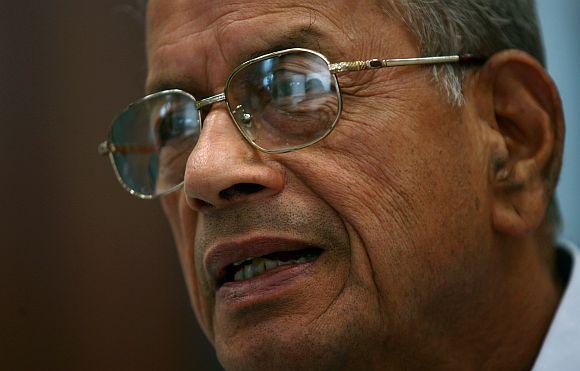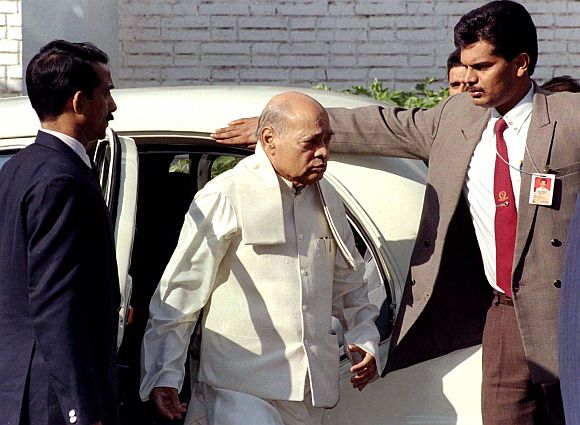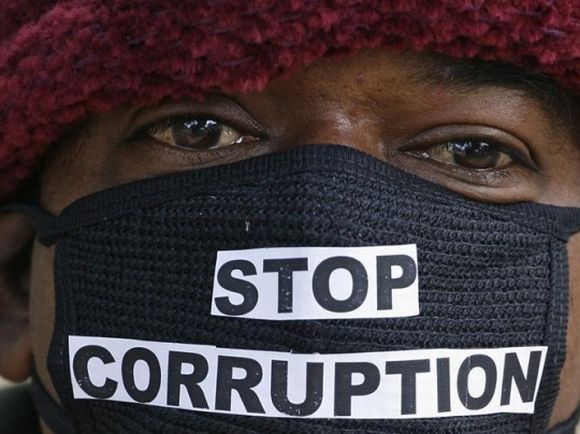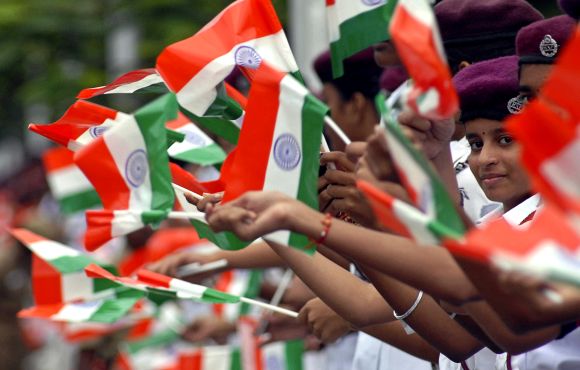 | « Back to article | Print this article |
Dr Kalam asks: What will YOU be remembered for?
Former President Dr APJ Abdul Kalam recently addressed the valedictory function of the 86th foundation course at the National Academy of Direct Taxes in Nagpur. We present here an excerpt from Dr Kalam's inspiring speech
On November 22, I went to Jorhat for addressing the World Tea Science Congress. There I addressed the administrative and police officers of Jorhat and Dibrugarh district. After my talk I administered an oath to the participants: 'I will work with integrity and succeed with integrity'.
The decibel level was very high when they said 'work with integrity' and decibel level went down when they were repeating 'succeed with integrity'.
But the next day, I saw a very beautiful situation in the World Tea Science Congress in the presence of Assam Chief Minister (Tarun Gogoi) and the Jorhat administrative team. I saw in front of me the chairman of Tea Board, MGVK Bhanu, an IAS officer, giving the introductory speech to the participants of the World Tea Science Congress.
Bhanu said, 'Yesterday, Dr Kalam administered an oath to all the IAS and IPS officers including myself. I would like to assure youDr Kalam that I have worked with integrity and succeeded with integrity during the last 24 years as an IAS officer in different parts of the state and the Centre.
Now I am in the Tea Board. I was secretary to the CM of Assam. I would like to assure Dr Kalam that I have tried to create a brand of moral uprightness in all my tasks".
Bhanu also mentioned that he was thinking for the whole night, 'what should he be remembered for'.
Bhanu said that he has developed a pledge for himself and he would like to be remembered for making India the largest producer of tea, and largest exporter of tea in the world.
I am very happy to share this unique experience of the person belonging to your tribe, so that it will enable you to evolve yourself and shape your life in whatever task you will be doing.
Please click NEXT to read further....
'Conscience is the light of the soul'
What you will be remembered for? You should write it on a page. That page may be a very important page in the book of human history. And you will be remembered for creating that one page in the history of the nation -- whether that page is the page of invention, the page of innovation or the page of discovery or the page of creating societal change or a page of removing the poverty or the page of fighting injustice or a page of enhancing the biodiversity, or a page in designing a foolproof system of railway safety or innovations in personnel, financial and trade management. I will be happy if you could write this page and mail it to me.
Now let me discuss an important aspect of human behaviour, which is conscience that is the foundation for all our behaviour and action in our family life, social life and professional life.
Conscience is the light of the soul that burns within the chambers of our psychological heart. It is as real as life is. It raises the voice in protest whenever anything is thought of or done contrary to righteousness.
Conscience is a form of truth that has been transferred through our genetic stock in the form of the knowledge of our own acts and feelings as right or wrong. Now let us look at, how important the righteousness in the heart.
For achieving good governance and a great society, the starting point is righteousness in the heart. I am happy that the important aspect of righteousness, honesty, selflessness and integrity are embedded in the curriculum of this foundation course.
Click NEXT for more...
'Delhi Metro brought to the country the most advanced rail technologies'
Since all of you will be taking up responsible assignments in government, I would like to present two role models whom you can follow for developing the characteristics of passion to realise vision and a leader who has the courage to take a decision.
First, let me describe to you an example of how passion to realise the vision has facilitated the successful and on-time implementation of a $3billion metro-rail project by the managing director of a public sector organisation.
The Delhi Metro Rail Project has given to the nation the potential of executing a fast transportation system using high technology with reliability through a time-bound mission mode operation.
Delhi, the capital of the country with over 20 million population, has the distinction of having a world class metro rail with frontline technologies. The work on metro rail commenced on October 1, 1998, and the first phase with three lines covering 66 km has been completed by December 2005. Today the overall route length created by Delhi Metro is around 190 km. Everyday, the metro handles an average movement of two million passengers.
Delhi Metro Rail Corporation has brought to the country, the most advanced rail technologies for the first time. Here is a leader who has passion and passion for excellence. The notable gains to the country are, light weight stainless steel, sleek, modern trains with pneumatic springs, regenerative braking, public information display, wide vestibules and automatic doors.
The sophisticated coach technology which was not available in the country so far, has been transferred to M/s Bharat Earth Movers Ltd, Bangalore, which is now assembling these trains with progressive indigenisation. BEML is now in a position to supply train sets needed for Phase-II of Delhi Metro Rail Project and meet the requirement for metros coming up in other cities of the country.
E Sreedharan, the managing director of Delhi Metro Rail Corporation has ensured that all the scheduled sections were completed by their target date or before and within their respective budgets through his programme management skills.
The dedicated and transparent leadership backed up with professional competence of Sreedharan has given to the nation, one of the best transportation systems of the world at the most economic cost.
He is a recipient of many national and international awards. Also, he is in demand for undertaking the development of the metro system in different countries of the world which he has politely declined due to preoccupation with committed Indian programmes.
Click NEXT for more...
'Maturity and professional excellence of a patriotic statesman'
Friends, I still remember a scene during May 1996. It was 9 O'clock at night. I got a call from the then prime minister's house that I should meet Prime Minister PV Narasimha Rao immediately.
I met him just two days before the announcement of general election results. He told me, "Kalam, be ready with your team for the N-Test, and I am going to Tirupati. You wait for my authorisation to go ahead with the test. DRDO-DAE (Defence Research and Development Organisation-Department of Atomic Energy) teams must be ready for action."
Of course, the election result was quite different from what he anticipated. I was busy in Chandipur missile range. I got a call saying that I must meet immediately the prime minister designate Atal Bihari Vajpayeeji with Narasimha Raoji.
I witnessed a unique situation. Narasimha Raoji, the outgoing prime minister, asked me to brief the details of N-programme to Vajpayeeji, so that a smooth takeover of such a very important programme can take place.
This incident reveals the maturity and professional excellence of a patriotic statesman who believed that the nation is bigger than the political system. Of course, after taking over as prime minister in 1998, the first task given by Vajpayeeji to me was to conduct the nuclear test at the earliest.
Both these leaders had the courage to take difficult decisions boldly, even though the consequences of such a decision have great national and international significance.
Click NEXT for more...
'We have to defeat the problem and succeed'
I talked to the civil service officers about creative and innovative leadership and evolution of a better world. After the session, some unique questions were raised by the participants which highlight the opportunities and challenges in governance faced by the nation's highest level of bureaucracy. I thought of sharing them with you and get your views on them.
I asked the young officers to find out how they can be creative leaders who can pioneer great missions in life. After the lecture, one young lady officer got up and asked, 'Dr Kalam, the bureaucracy is trained and known for maintaining status quo. In this context, how can I be creative and innovative?'
Another young officer said, 'Dear sir, right now, at the start of our service, we are all ethically upright and resolute for integrity. We all want to work hard and make a change. But in a decade's time, in spite of our surroundings, how do I still maintain the same values with enthusiasm?'
To these questions, I replied that the young officers entering into governance have to determine a long term goal for which they will be remembered. This goal will inspire them at all times during their career and help them overcome all problems. I told them that the young bureaucrats of the nation have to remember that when they take up difficult missions, there will be problems. Problems should not become our captain, we have to defeat the problem and succeed.
Another young officer asked me, 'Dr Kalam, just now you administered an oath 'I will work with integrity and succeed with integrity'. But the political system and seniors who are corrupt, would definitely put pressure on the young bureaucrats to compromise on their ethical standards, how can we tackle this problem?'
I thought about this problem which is very pertinent and practical. I responded by recalling my own experience where I worked very closely with politicians and administrators including positions like secretary -- in Defence Research and Development Organisation and as scientific advisor to the Raksha Mantri, principal scientific advisor to the Government of India. In all these positions, I was in charge of large missions with huge capital investments. I recall that at no point did any leader or administrator approach me for favours.
Then I told the young officers that they can definitely establish a brand of integrity for themselves which will be called the circle of your brand to keep away all those who want make them compromise ethically. Of course, this may mean facing some problems as an individual grows. Finally the best in human beings will succeed in life.
Click NEXT for more...
'For a society to have ethics, families should adhere to a value system'
Working with integrity leads to sustainable growth of the nation. How is it possible? We need to have national ethics for sustainable growth and peace. Where does it start from?
a) Our nation has to have ethics in all its tasks, for our sustainable economic growth, prosperity and peace.
b) If the nation is to have ethics; society has to promote ethics and value system among all its constituents.
c) If society is to have ethics and value system, families should adhere to ethics and a value system.
d) If families have to get evolved with ethics and value system, parenthood should have inbuilt ethics.
e) Parental ethics come from great learning, value-based education and creation of clean environment that leads to righteousness in the heart.
My best wishes to all the members of the National Academy of Direct Taxes success in their mission of developing quality human resource for public service and governance.
